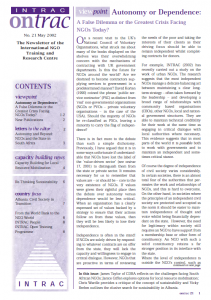 On a recent visit to the UK’s National Council of Voluntary Organisations, what struck me about many of the books displayed on the shelves was their overwhelming concern with the mechanisms of contracting with UK government departments. Is this the future for NGOs around the world? Are we destined to become contractors supplying services to government in a predetermined manner? David Korten (1990) coined the phrase ‘public service contractor’ (PSC) as distinct from ‘real’ non-governmental organisations (NGOs or PVOs – private voluntary organisations – in the case of the USA). Should the majority of NGOs be re-classified as PSCs, leaving a minority to carry the flag of independence?
On a recent visit to the UK’s National Council of Voluntary Organisations, what struck me about many of the books displayed on the shelves was their overwhelming concern with the mechanisms of contracting with UK government departments. Is this the future for NGOs around the world? Are we destined to become contractors supplying services to government in a predetermined manner? David Korten (1990) coined the phrase ‘public service contractor’ (PSC) as distinct from ‘real’ non-governmental organisations (NGOs or PVOs – private voluntary organisations – in the case of the USA). Should the majority of NGOs be re-classified as PSCs, leaving a minority to carry the flag of independence?
Ontrac 21 explores the complex question of NGO autonomy in different contexts from Eastern Europe to South Africa. It focuses on what sustainability means in reality and options for local resource mobilisation. Both international development NGOs in the North as well as NGOs in developing and transitional countries will increasingly face the decision to curtail growth – or even shrink – as the cost of maintaining independence. The decision to ‘downsize’ seems to be one many NGOs still try to avoid in a sector which has accepted growth as the norm. We will watch with interest for examples of NGOs that make the difficult decision not to grow but to go for independence of voice as their first priority.
Also in this issue, James Taylor of CDRA reflects on the challenges facing South African NGOs, Janice Giffen explores options for local resource mobilisation, Chris Wardle provides a critique of the concept of sustainability and Vicky Brehm outlines the elusive search for sustainability in Albania.
Download:
ONTRAC 21. Autonomy or dependence: A false dilemma or the greatest crisis facing NGOs today?
.pdf (0.11mb)
Download:
ONTRAC 21. Autonomy or dependence: A false dilemma or the greatest crisis facing NGOs today? French
.pdf (0.05mb)